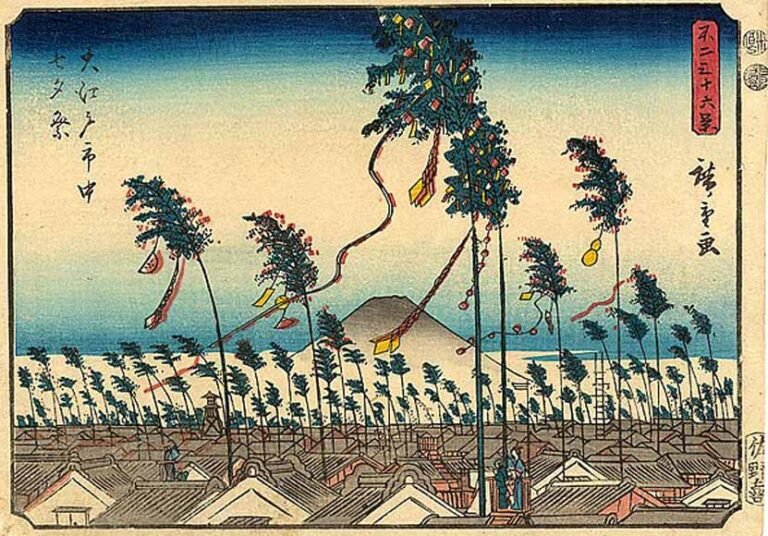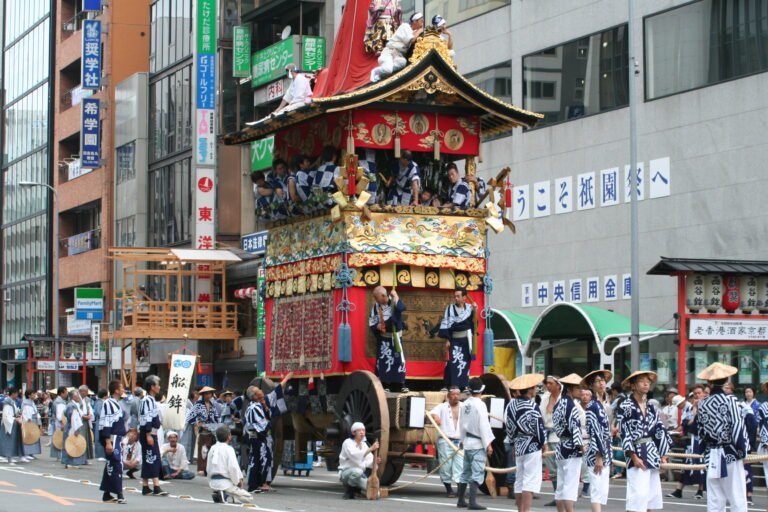Shinto (神道, the way of the gods or the way of the divine) or Shintoism is a set of beliefs dating from the ancient history of Japan, sometimes recognized as a religion. It mixes polytheistic and animistic elements.
From time immemorial, the Japanese have worshiped kami — spirits that inhabit or represent a particular place, or embody natural forces like wind, rivers, and mountains. Each time a village was created, a sanctuary was erected to honor the surrounding spirits and thereby ensure their protection. It was believed that kami could be found everywhere, that no place in Japan was beyond their power. Shintoism therefore encompasses the doctrines, institutions, rituals and community life based on the worship of the kami.

Contents
ToggleShinto festivals
Holidays of the month
July 1, 2025 (1 event)
July 1, 2025

Today, the Japanese of Fukuoka celebrate Hakata Gion yamakasa until July 15. Famous for its one-ton chariot race, its history is some seven hundred and fifty years long. #mythology #myth #legend #calendar #July 1 #Japan #fukuoka #hakata
July 7, 2025 (1 event)
July 7, 2025

Today, the Japanese celebrate Tanabata (night of the 7th) originating from the O-Bon Bhuddists and Chinese Star Festival. It celebrates the meeting of Orihime and Hiko-boshi, separated by the Milky Way but able to meet once a year. #mythology #myth #legend #calendar #7July #tanabata #japan
July 14, 2025 (1 event)
–
July 14, 2025
Today, the Japanese of Nachikatsuura celebrate Nachi no hi matsuri (Nachi fire festival). The meaning of the festival is understood as the regeneration and prosperity of the life force, as well as the prosperity of agriculture. Water is the main body of waterfalls, an ancient object of worship in Nachi, and is considered the source of life, while fire represents the source of vitality for all things. #mythology #myth #legend #calendar #July 14 #nachi #Japan #shinto
July 17, 2025 (1 event)
July 17, 2025

Today and for a week, the inhabitants of Kyoto celebrate Gion matsuri. At the time, natural disasters were thought to be caused by curses from the souls of brutal deaths. This is how the Gion Matsuri was born, being originally a goryō-e the exorcism of wrathful souls. #mythology #myth #legend #calendar #kyoto #July 17 #gion
July 19, 2025 (1 event)
–
July 19, 2025
Today, the Japanese of Saitama celebrate Kumagaya Uchiwa Masturi (fan festival). The festival began in 1750. Mikoshi was first made in 1830 and around 1902, when merchants began offering uchiwa to their customers. At the same time, the city grew thanks to the development of the silk industry. Each district began purchasing dashi to represent their wealth; they argue which district has a bigger and good quality dashi. #mythology #myth #legend #calendar #July 19 #Japan #uchiwa #mikoshi
July 24, 2025 (1 event)
July 24, 2025

Today, in Osaka, Japan, Tenjin matsuri takes place. It'is a festival under the protection of the Tenmangu Shrine dedicated to Sugawara no Michizane, the god of studies and the arts, who was a scholar and politician of the Heian period in Japan. #mythology #myth #legend #calendar #July 24 #osaka #japan #tejinmatsuri
Cultural areas of Shintoism
Shintoism is an animist religion. The major concept of Shintoism is the sanctity of nature. The resulting deep respect defines the place of man in the universe: to be an element of the great All. Thus, a watercourse, a star, a charismatic character, a simple stone or even abstract notions such as fertility can be considered as divinities. Respect for ancestors and feelings of communion with the forces of the universe and past generations are the spiritual bases of Shinto.
Issued from the cosmic Unity, the flows founding life are embodied in a multitude of kami. The polytheism that emanates from it is infinite, in the sense that each particle of life is sacred. Shinto mythology says that there are 8 million kami Happyakuman (八百万?) because the kanji are also read yaoyorozu, meaning a myriad, that is to say an indefiniteness, an unquantifiable number. By descending to Earth to breathe life into it, the kami created the Japanese archipelago.
Countless, the kami are everywhere, hiding in the most diverse forms, in the most unexpected places. It is therefore advisable to be extremely careful with them, especially since the smallest are sometimes the most susceptible. Their character is ambiguous, like nature itself. All of them, including the best among them and the greatest, possess a "spirit of violence", arami-tama (荒御魂), which must be reconciled or neutralized by appropriate rites.
Some are even dangerous in their principle, such as the "gods of epidemics" or the "gods of insects", predators of rice. All can hit you with a Tatar (祟り). The old definitions that are given of it have a more physical than moral character: it is thus that contact with death, blood, excrement provokes ritual defilement; but life in society will lead to a broadening of this notion of tsumi, and certain social offenses will be qualified as such (destruction of a dyke of rice fields).
In principle, however, the tsumi, like the tatari which is its almost automatic consequence, seems to have to be defined in a way that is both more vague and more general. Numerous examples, even recent ones, indeed show that one can be struck by a Tatar as long as one has encroached, even unconsciously, on the domain of a kami; the tsumi is in short the transgression of certain limits, not always formally prohibited or specified, but charged with a formidable magical potential due to the mere presence of the kami.
Purification rituals are of singular importance in Shinto belief. To escape the consequences of an imprudently incurred tatari, it is necessary to "purify" those around you (祓う) or yourself (清む). These two terms are used to define the usual actions of cleaning "sweeping, cleaning, washing", and other more symbolic with ritual ablutions.





